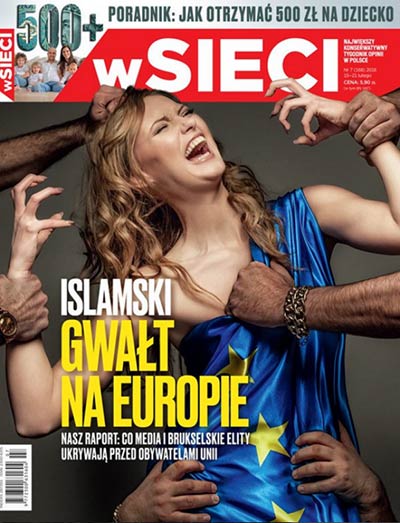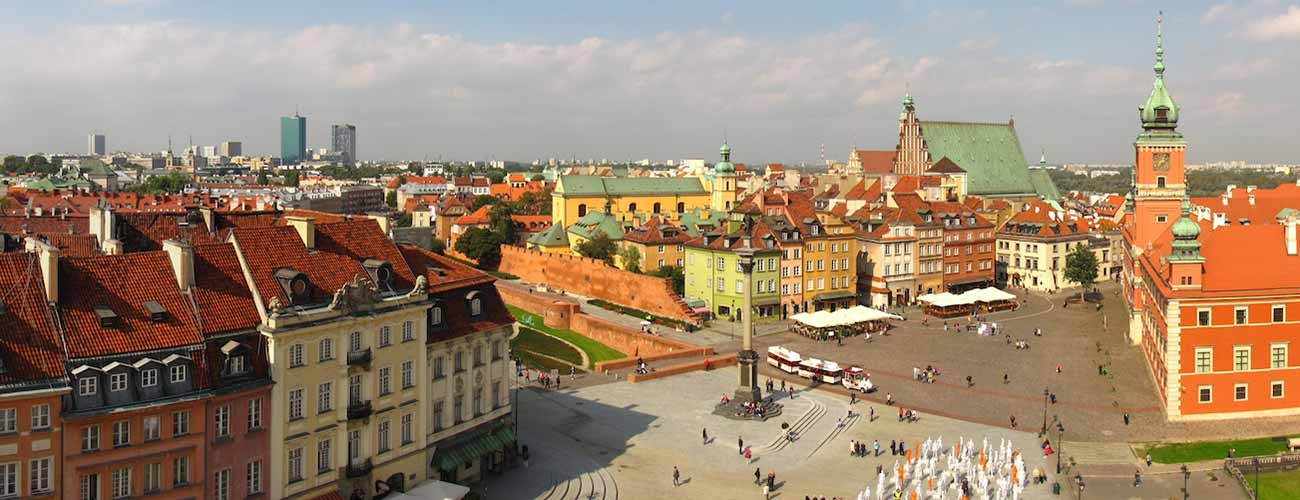Earlier this month, a conservative weekly in Poland published a cover photo depicting six disembodied, olive-hued hands groping a white woman dressed in a European Union flag. “The Islamic Rape of Europe,” ran the headline.
The cover of the Polish magazine wSieci was widely decried as Islamophobic, with one commentator writing that it “carries immediate echoes to nationalist propaganda of an uglier historical moment,” and noting the picture’s similarity to 1930s fascist propaganda.

The February cover of wSieci.
But what began as an argument over how to appropriately cover immigration—a story that has roiled the region for months—is also part of a wider debate over European nationalism’s effect on the continent’s press. Poland, which recently elected one of the continent’s most conservative governments, has become the canary in the coal mine.
Charges of rising nativism in Poland’s press come just two months after the country’s rightist Law and Justice party, which took power in a landslide legislative victory in October, pushed through a hastily-drafted amendment to the country’s media law, granting the government tighter control of the country’s public news services.* Several high profile Polish journalists have either been fired or quit in protest since the law took effect in early January.
Early this month, Polish culture ministry official Krzysztof Czabański* told Germany’s Deutsche Welle that he hopes to transform the state news services into outlets with a “national mission” focused on Polish history and patriotism.*
Cleaning house at the public broadcasters is common after a change in government in Poland, says Anna Słojewska, a longtime Brussels correspondent with private Polish daily Rzeczpospolita. “It wasn’t like the public media was very objective under the previous government—it wasn’t,” she says. “People know they have different media, and normally the public media is linked to the government.”
But the recent moves have wrought unprecedented structural changes on the public broadcasting system, which was created in 1993, shortly after the end of the Cold War.
The system included several television and radio broadcasting companies owned by the Polish government but overseen by a semi-autonomous administration board called the National Broadcasting Council. The Law and Justice party’s January reforms effectively bypassed that administrative structure, shifting operation of the system, including the right to hire and fire journalists and editors, from the NBC directly to the executive branch of the Polish government. Poland’s Treasury Minister now oversees public broadcasting.*
“Once they changed the law, and it was signed by the president, the pace was incredible,” says Adam Szynol, a professor of journalism and social communication at Poland’s University of Wroclaw, and a critic of the amendment.* “Each government tries to have influence on public media, but with this president, it was overnight.”
European Union observers outside Poland have sharply criticized the new scheme. The director general of the European Broadcasting Union, a body that includes most of the continent’s public broadcasters, called the changes “a worrying interpretation of the public service media remit.”
International criticism, however, has largely worked in Law and Justice’s favor, making the fight over the media law Exhibit A for the ruling party’s argument that European agencies meddle too much in Polish affairs. When EU media commissioner Günther Oettinger, a German citizen, criticized the new media rules, incoming Polish Justice Minister Zbigniew Ziobro brushed off the claims by citing Nazi Germany’s 1939 invasion of Poland.
Some have protested against the changes, but not all Polish reporters oppose them. “We have two private [television stations] that are not in favor of this government. If the public television is supporting the government, that is more normal for me, because you have more balance,” says Dominika Cosic, who covers European affairs for daily Dziennik Gazeta Prawna and weekly news magazine Do Rzeczy.* Polish public opinion is increasingly skeptical of European initiatives, particularly German-led efforts to resettle refugees from the Middle East across the continent, and Polish state media is merely reflecting that, she says.
The apparent move to turn the state news services into party organs appears similar to a 2010 effort in Hungary by then-new leader Victor Orban, who seized control of that country’s media through a series of strikingly similar legal and administrative reforms within weeks of his nationalist Fidesz party taking power.* Hungary faced criticism from European and international press freedom advocates, but moved ahead with the reforms, and has been rated only “partly free” by Freedom House’s widely-followed Freedom of the Press report since 2011.
“The Hungarian example makes people think perhaps we should react, we should be tougher, because we didn’t react in Hungary,” says Słojewska, the Brussels correspondent. The European rush to defend Polish public media, she says, is a way for embattled European Union institutions, weakened by their mishandling of the continent’s ongoing financial and migration crises, to prove they can still impose continent-wide standards. For Law and Justice, the stakes are proving that Poland can defy “European norms” of public press freedom and get away with it, she says.
Public broadcasting holds about a 20 percent share of the Polish television and radio audience, and remains influential in Polish politics, according to Szynol. “They’re still opinion makers for policy makers, they’re still the leaders on TV, and in commentary,” he says. But Law and Justice has also announced desires to shrink foreign ownership of Poland’s privately-owned media, believed to be as high as 80%, and bring most under control of Polish companies. “They say they want to ‘re-Polandize’ it,” says Szynol. “But how they intend to do that, no one knows.”
The Guardian has noted that Jarosław Kaczyński, leader of Law and Justice, used one of his first speeches after taking office to inveigh against the country’s largest private newspaper, Gazeta Wyborcza, a left-leaning paper often used as a tip-sheet by foreign observers. Kaczyński termed the paper’s attacks on Law and Justice “against the very notion of the nation.”
Still, criticism of the new media law from outside Poland has been met with scepticism even by some of the law’s critics. “It’s not that I’m going to defend it,” says Słojewska. “If you watch the [public] reporting now, it’s like the old communist times.” But Poland’s previous left wing government “also fired people who were more right wing, and nobody here [in Brussels] said anything,” she says.
The sudden firestorm about the media law from European neighbors is a reaction to Law and Justice’s sharply anti-European ideology, she says, more than a defense of the public media system. “The Law and Justice party is a very easy target,” she says.
*Corrections: An earlier version of this story understated the impact of the Polish media law on Polish state radio and TV broadcasters and incorrectly described the Polish Press Agency as a broadcaster. It gave an incorrect title for Polish official Krzysztof Czabański and incorrectly identified Poland’s government-run National Broadcasting Council as a “public-private” entity. Additionally, an earlier version of this story misspelled Adam Szynol’s last name and included a quotation from Dominika Cosic that referred to “two private newspapers.” That line has been corrected to refer to private television stations.
Marc Herman is a reporter based in Barcelona. He is the author of The Wizard and the Volcano, The Shores of Tripoli, and Searching for El Dorado, and a co-founder of Deca.

